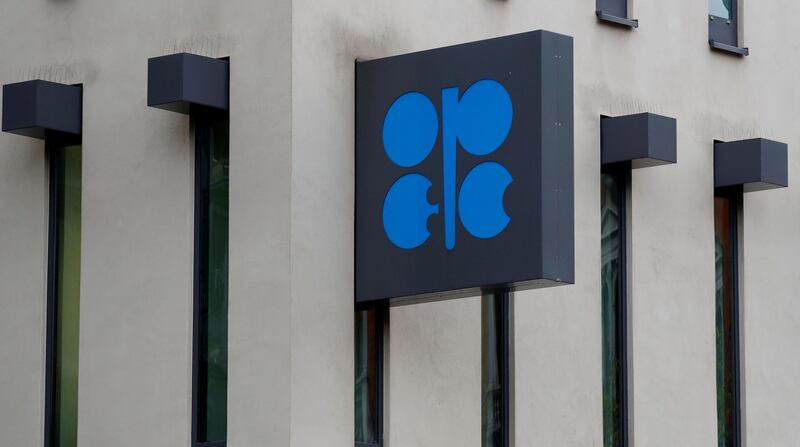An Opec+ joint technical committee recommended extending a global pact to curb production until the end of 2020, with provisions for a temporary deepening of cuts to counter the impact of the coronavirus on the oil markets.
Algeria's oil minister Mohamed Arkab, who currently holds the rotating Opec presidency recommended "an additional reduction in production be made until the end of the second quarter of 2020", according to a statement.
Opec+, the alliance led by Saudi Arabia and Russia, has been cutting back 1.7 million barrels per day since the beginning of January in response to slowing oil demand growth. The pact was to hold the current production levels until the first quarter of the year, with Opec+ expected to review it at their meeting in Vienna on March 5 and 6. The agreement, which also includes pledges for additional voluntary commitments of 400,000 bpd from Saudi Arabia, will now be extended until year-end as a result of the coronavirus’s disruption of global supply chains, trade and businesses that has dented consumption.
The joint technical committee, which includes Algeria, Saudi Arabia, Russia, the UAE, Iraq, Kazakhstan, Kuwait and Nigeria, was said to have recommended additional cuts of 600,000 bpd until the second quarter of the year at their latest meeting, according to media reports. Mr Arkab did not specify the volume of additional cuts, which will be discussed at Opec's meeting next month. However, the JTC's recommendations are non-binding and only a ministerial meeting can enforce the production cuts.
Iran has backed the cuts, with oil minister Bijan Zanganeh quoted as saying by the Mehr news agency that he supported the group "reducing output as much as they would want to."
Non-member Oman, which is compliant with the current Opec pact, also backed a short-term reduction in oil output.
"Oman supports the recommendation of Opec+ JTC for a potential short, deeper cut agreement, where Opec+ would reduce oil output immediately until the end of the second quarter, while we continue monitoring the impact of the coronavirus on oil demand growth,” Omani oil minister Mohammed Al Rumhy told Reuters on Saturday.
Russia, though, said it requires more time to assess the impact of the coronavirus on oil markets before committing to any cuts and said it will consult with other producers later this week.
"With the scale of demand slowdown still an unknown variable, the Russian view may be to err on the side of caution and not risk cutting output should prices stabilise in the $50-$60 per barrel over the coming weeks," said Edward Bell, commodity analyst at Emirates NBD.
Brent, the most widely-used international benchmark settled at $54.47 per barrel on Friday, while West Texas Intermediate, which tracks largely North American crude grades closed the week at $50.34 per barrel. Brent has fallen by nearly $11 since January as markets factored in the economic fallout from the coronavirus outbreak.
China is the world's biggest buyer of oil and a slowdown in energy consumption due to a government enforced lockdown will have huge ramifications for the global crude markets. State-owned refiner Sinopec is said to have cut its monthly throughput by 12 per cent – the company’s steepest in over a decade –after the epidemic crimped fuel demand, Reuters reported last week, citing sources.
"Markets will also be scanning reports out both from Opec and the International Energy Agency later this week for further analysis on how badly China’s demand will be impaired this year," said Mr Bell.
Previous forecasts by Opec and the IEA for 2020 were largely bearish with weak demand growth expectations and high supply growth from non-Opec producers.








